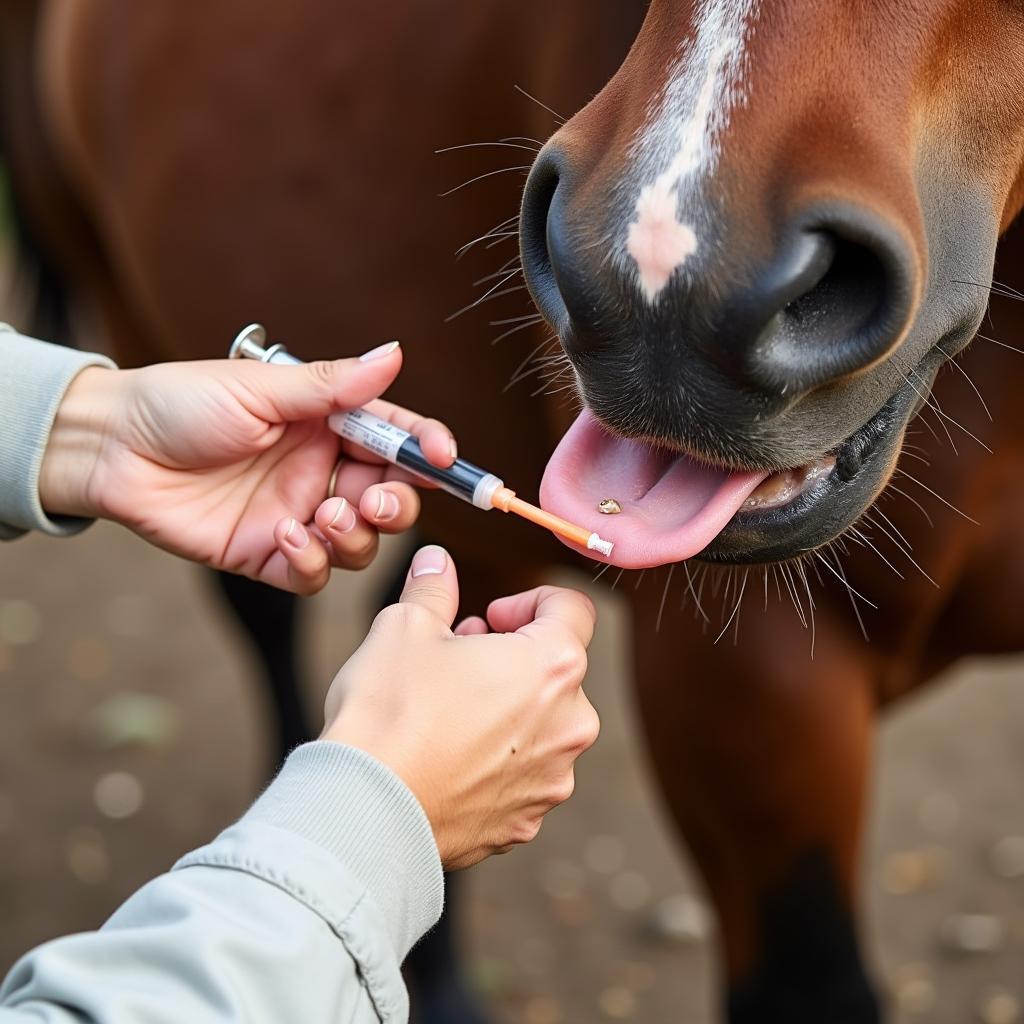Strongid Horse Dewormer, known generically as pyrantel pamoate, is a common and effective tool in equine parasite control. Understanding its uses, benefits, and potential drawbacks is crucial for every horse owner dedicated to their animal’s well-being. This guide delves into the essential information you need to know about Strongid, equipping you to make informed decisions regarding your horse’s health. We’ll explore everything from dosage guidelines and administration techniques to the importance of deworming rotations and recognizing the signs of parasitic infestation.
What is Strongid Horse Dewormer?
Strongid, or pyrantel pamoate, is an anthelmintic, meaning it’s designed to combat internal parasites. It’s particularly effective against strongyles, a common and potentially harmful type of worm found in horses. Strongid works by paralyzing these parasites, allowing them to be expelled from the horse’s digestive system. It’s available in various forms, including paste, suspension, and granules, offering flexibility in administration based on your horse’s temperament and your personal preference. Strongid wormer for horses is a valuable tool for maintaining your horse’s health, but it’s crucial to use it responsibly and as part of a comprehensive parasite management plan.
Understanding the Importance of Deworming
Parasites can wreak havoc on a horse’s health, leading to a range of issues from weight loss and poor coat condition to colic and even more serious complications. Regular deworming is a cornerstone of preventative care. While Strongid is effective against certain parasites, it’s important to remember that no single dewormer is a silver bullet. Dewormer rotation for horses is essential to prevent parasite resistance and ensure comprehensive protection against various worm species.
 Administering Strongid Horse Dewormer Paste
Administering Strongid Horse Dewormer Paste
Administering Strongid: Dosage and Methods
The correct dosage of Strongid horse dewormer depends on your horse’s weight. It’s crucial to follow the instructions provided on the product label or consult with your veterinarian for specific guidance. Overdosing can be harmful, while underdosing can be ineffective and potentially contribute to parasite resistance. Worming paste horses is a common method due to its ease of use. Other options, like the suspension or granules, might be more suitable for certain horses. Always ensure accurate measurement and administration.
Strongid for Horses: Targeted Parasites
Strongid is highly effective against ascarids (roundworms), which are particularly prevalent in foals and young horses. It also targets strongyles, including the dangerous bloodworms that can cause significant damage to the horse’s intestinal lining. However, it’s less effective against other parasites such as tapeworms and bots. Therefore, a strategic deworming program incorporating different dewormers is crucial for comprehensive parasite control. Strongid for horses offers targeted protection against specific worm types, highlighting the need for a tailored approach to deworming.
Recognizing the Signs of Parasites in Horses
While regular deworming is preventative, it’s essential to be vigilant for signs of parasitic infestation. These can include weight loss, a dull coat, diarrhea, and decreased appetite. If you notice any of these symptoms, consult your veterinarian immediately. A fecal egg count test can help determine the type and severity of the infestation, allowing for targeted treatment.
Pyrantel for Horses: Integrating into a Deworming Schedule
Pyrantel for horses, the active ingredient in Strongid, should be integrated strategically into a comprehensive deworming program. Rotating dewormers with different modes of action helps prevent parasite resistance and provides broader spectrum control. Your veterinarian can help you develop a tailored deworming schedule based on your horse’s age, health status, and risk factors.
“Regular fecal egg counts are essential for monitoring parasite loads and informing deworming strategies,” advises Dr. Emily Carter, DVM, specializing in equine parasitology. “This personalized approach ensures effective parasite control while minimizing the risk of resistance.”
“Remember, responsible deworming involves more than just administering medication,” adds Dr. Sarah Mitchell, DVM, an equine internal medicine specialist. “Maintaining a clean environment, managing manure effectively, and practicing good pasture management are all crucial components of a comprehensive parasite control program.”
Conclusion
Strongid horse dewormer is a valuable tool in equine parasite management. Understanding its proper usage, dosage, and limitations is key to ensuring its effectiveness and preventing parasite resistance. By incorporating Strongid into a well-planned deworming program and remaining vigilant for signs of infestation, you can contribute significantly to your horse’s overall health and well-being. Strongid, combined with responsible horse ownership practices, is a key factor in ensuring your equine companion thrives.
FAQ
- How often should I deworm my horse with Strongid?
- Can I give Strongid to pregnant mares?
- What are the potential side effects of Strongid?
- How do I store Strongid horse dewormer?
- Can I use Strongid in conjunction with other dewormers?
- How do I know if my horse has worms?
- What is the difference between Strongid and other dewormers?
For further information on horse care and specific dewormer information, please explore other articles on our website.
Need help with your horse’s deworming program? Contact us!
Phone: 0772127271
Email: [email protected]
Address: QGM2+WX2, Vị Trung, Vị Thuỷ, Hậu Giang, Việt Nam.
We have a 24/7 customer support team ready to assist you.